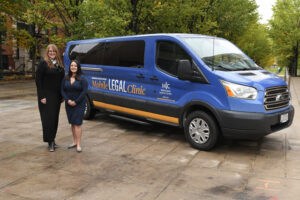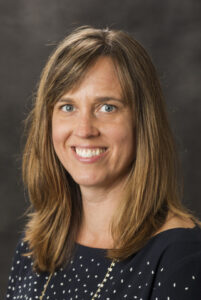The Mobile Legal Clinic Speeds Forward
On September 17, 2013, the following announcement was made in a Marquette University press release:
Marquette Law School and the Milwaukee Bar Association are partnering to launch the Milwaukee Justice Center Mobile Legal Clinic, a specially outfitted bus designed as a vehicle to provide free, brief legal advice to individuals who find themselves outside of the areas currently served by legal volunteer efforts in metropolitan Milwaukee.
The Mobile Legal Clinic is believed to be the only service of its kind in Wisconsin, and one of only a handful in the nation delivering volunteer legal services in underserved areas.

The 2013 release detailed the origins of the project, the succinct statement being this: “The Mobile Legal Clinic was made possible by a gift from Frank Daily, Law ’68, and Julianna Ebert, Law ’81, to honor the pro bono work of Mike Gonring, Law ’82, their friend and longtime partner at Quarles & Brady.” It described the Milwaukee Justice Center more generally—a collaborative project of Marquette Law School, the Milwaukee Bar Association, and the Milwaukee County Clerk of Courts.
Since its rollout, the Mobile Legal Clinic has made an important contribution to access to justice in the Milwaukee region. Just to give a sense of it: During the past nine years (and one month), on the Mobile Legal Clinic, more than 240 volunteer lawyers and Marquette law students have served 2,945 community members at 43 host sites. These sites are key service providers in the community—venues that people are frequenting for help with a range of needs.
The sites include public libraries, food pantries, and health clinics—places where community members may seek services connected, directly or tangentially, to a legal issue. For example, someone in need of help feeding his or her family might be facing an eviction. Or someone visiting a free health clinic might wish to appoint a power of attorney or write a will. More precise locations have included multiple Milwaukee Public Library branches (e.g., Forest Home, Martin Luther King, Mitchell Street), the Milwaukee Rescue Mission, the Riverwest Food Pantry, St. Benedict the Moor Parish, St. John’s Lutheran Church in West Milwaukee, and the Sixteenth Street Community Health Center, to name (truly) only a few.
To be sure, some aspects of the project have changed. Some of the individuals involved in leading the project are different: For example, Mary Ferwerda, Law ’11, the original supervisor of the Mobile Legal Clinic, is now executive director of the Milwaukee Justice Center, and Marisa Zane, Law ’11, is the supervisor of the Mobile Legal Clinic.
And now, for the development occasioning this post, the original bus has been replaced by an entirely new one. (See the photo accompanying this post.)
The new Mobile Legal Clinic is different. It no longer is specially outfitted with office space inside. Instead, it is a passenger vehicle to transport volunteers. This change resulted from years of experience hosting legal clinics inside a vehicle during times of rain, snow, heat, and freezing temperatures. Most of the time, the legal clinics ran more efficiently and effectively when held inside a building to which the Mobile Legal Clinic had arrived.
Yet a few people associated with the project—and one important “thing”—have remained the same. The former include, in particular, the three people noted above in the excerpt from the 2013 release: Frank Daily, Julie Ebert, and Mike Gonring, in different yet overlapping ways, continue to support the Mobile Legal Clinic. We are so grateful for their support, example, and service.
And the thing that has not changed? Without doubting that it could be stated in any number of ways, I would describe it as the spirit and ideals animating this project. I would say the spirit and ideals of Marquette University Law School—the school’s mission of Excellence, Faith, Leadership, and Service—and there would be considerable truth to this. Certainly, this is what especially motivates us “at” or “from” the Law School—those who have the privilege to work here or are Marquette lawyers (or both).
Yet, for all the leadership that Marquette Law School may have furnished, this is a project, in both its origins and its operations, that also has drawn substantially on the talents and values of others in the legal profession, without a direct connection to the Law School. Once again, it is an example of how much better able we are to serve others when we have the sorts of partnerships that have characterized the Mobile Legal Clinic. If you are a lawyer or law student who would like to get on board the Mobile Legal Clinic, let us know.

 Early this semester, I had the privilege of meeting with Marquette law students who this past summer held
Early this semester, I had the privilege of meeting with Marquette law students who this past summer held 